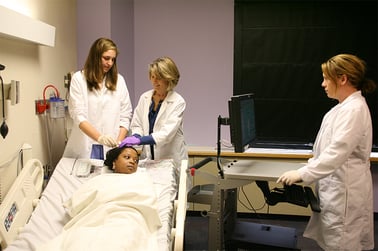This program is not currently accepting applications.
NDT Program Curriculum
Our online NDT certificate program provides an accelerated professional course background to prepare you to assist in the delivery of patient-centered care as a valued member of the healthcare team.
You will take the courses in the order listed below, gaining valuable experience in our clinical partner facilities. Not only will you will learn how to perform electroencephalograms (EEG), but you will also receive an introduction to long-term epilepsy monitoring (LTM), evoked potentials (EP), polysomnograms (PSG), and nerve conduction studies (NCS). Each specialized procedure aids in the diagnosis and treatment of neurological problems such as seizures, sleep disorders, and tumors.
